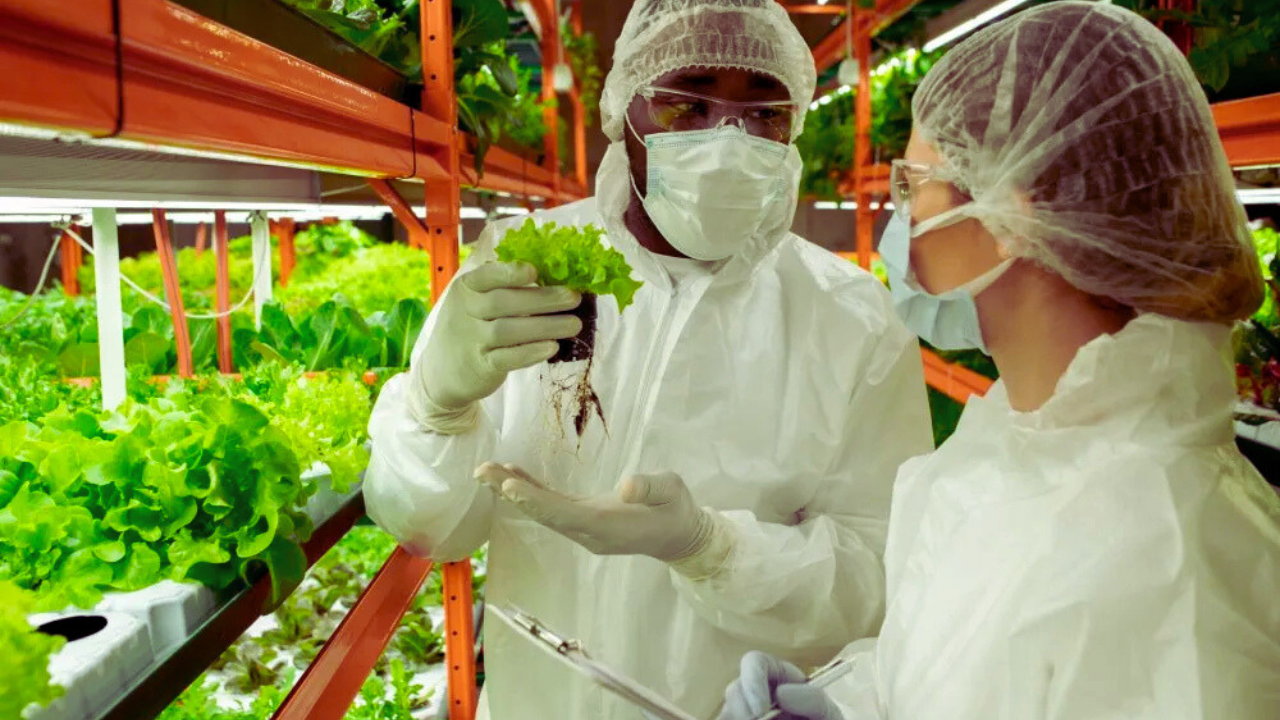Plant biology is an ever-evolving field that plays an essential role in solving some of the world’s most pressing issues, including food security, climate change, and environmental sustainability. The field focuses on the biological processes of plants, covering aspects such as plant structure, growth, reproduction, and function. As we move into 2025, the importance of plant biology continues to grow, driven by global challenges that demand innovative solutions. The increasing focus on sustainable agriculture, renewable energy sources, and environmental conservation has opened up numerous career opportunities for aspiring plant biologists. This has led to a surge in demand for professionals equipped with the skills to address these challenges, making plant biology a highly attractive field for future employment.
As technological advancements continue to reshape industries, plant biology is no exception. New research methods, biotechnology, genetic engineering, and advancements in plant breeding are transforming the way we approach plant science. This technological progress is leading to the development of innovative solutions for food production, crop yield improvements, and environmental sustainability. Plant biology jobs are no longer limited to traditional research roles; they now span diverse sectors such as agriculture, environmental consultancy, biotechnology, and policy-making. Professionals in plant biology are expected to drive innovation and play a pivotal role in addressing global issues like climate change, food scarcity, and biodiversity loss.
Career growth in plant biology is robust, with increasing opportunities in both public and private sectors. As organizations and governments invest more in research and sustainability, plant biologists are positioned to take on leadership roles in driving research and policy changes. The demand for experts in sustainable agriculture, plant genetics, and ecosystem management is expected to rise significantly in the coming years. For those interested in plant biology careers, 2025 presents a promising future, with abundant opportunities for specialization, advancement, and impactful contributions to both science and society. Whether through research, applied science, or policy advocacy, plant biology offers a fulfilling and growing career path.
The Growing Importance of Plant Biology

As environmental issues such as climate change and biodiversity loss become more pressing, the role of plant biologists has never been more critical. These scientists are at the forefront of developing solutions to these challenges, contributing to the fields of agriculture, biotechnology, conservation, and climate change mitigation. With the global population continuing to grow, the demand for professionals in plant biology is expected to rise significantly in the coming years. Plant biology has evolved from a niche academic subject to a vital area of research that impacts industries ranging from agriculture to pharmaceuticals. The study of plants and their ecosystems can directly influence sustainable farming practices, renewable energy sources, and even the development of new medicines.
Environmental Challenges and Plant Biology’s Role
As the world faces increasing environmental challenges like climate change and biodiversity loss, plant biology has taken on a more critical role. Plant biologists are key players in finding solutions that help mitigate these problems. Their work directly impacts agriculture, conservation, and climate change adaptation strategies, aiming to preserve ecosystems and reduce the environmental footprint of human activities.
The Interconnection Between Plants and Climate Solutions
Plants are central to global efforts to combat climate change. They absorb carbon dioxide, stabilize ecosystems, and are integral to sustainable agricultural practices. Plant biologists contribute by researching climate-resilient crops, developing better soil management practices, and creating methods to enhance plant growth even under changing climatic conditions, all of which are essential for future food security.
Impact on Agriculture and Food Security
As the global population grows, the demand for food increases. Plant biology plays a vital role in ensuring that crops are more resilient, productive, and nutritious. By studying plant genetics, biologists develop crops that can withstand extreme weather, pests, and diseases, thereby securing food supplies and reducing hunger worldwide.
Sustainable Farming Practices
Sustainable farming relies heavily on plant biology. By understanding plant behavior and interactions with their environment, plant biologists are helping to create farming methods that minimize environmental damage. This includes developing organic farming techniques, reducing pesticide use, and enhancing soil health—all of which contribute to long-term agricultural sustainability.
Plant-Based Solutions for Renewable Energy
Plants are also crucial in the quest for renewable energy. Plant biologists work on developing biofuels and plant-based energy solutions, reducing reliance on fossil fuels. They are investigating how plants can be used to generate energy more efficiently, which has the potential to transform the energy industry and contribute to a greener, more sustainable future.
Pharmaceutical Discoveries and Health
Plant biology doesn’t just benefit the environment; it also plays a significant role in human health. Many of the medicines we use today are derived from plants. By studying plant compounds, biologists are discovering new treatments and drugs that can combat diseases, improve health, and promote wellness across the globe.
Evolution of Plant Biology as a Field
Once seen as a specialized area of study, plant biology is now a vital, interdisciplinary field that impacts a wide range of industries. Its integration with fields like biotechnology, environmental science, and pharmacology has expanded its reach and importance, making plant biology crucial to solving global challenges and fostering innovation.
Growing Demand for Plant Biology Professionals
The increasing recognition of plant biology’s importance means that the demand for plant scientists is on the rise. As environmental issues grow and industries rely more on sustainable practices, plant biology offers an array of career opportunities. This trend is expected to continue in the coming years, with professionals in this field playing an essential role in shaping the future of food security, health, and sustainability.
Types of Plant Biology Jobs
Plant biology offers a variety of exciting career paths, catering to different interests within the field. Those passionate about scientific discovery and research may pursue careers as plant researchers, working in laboratories or academic settings to explore the genetics, physiology, and ecology of plants. These positions often involve publishing findings and contributing to advancements in agriculture, biotechnology, and environmental science. For those drawn to practical applications, roles in biotechnology offer the chance to apply plant science knowledge to develop new products such as biofuels, pharmaceuticals, and genetically modified crops.
Plant biologists working in these areas focus on preserving biodiversity, restoring ecosystems, and ensuring sustainable land management practices. Furthermore, teaching and education roles in plant biology provide the opportunity to inspire the next generation of scientists, either at the university level or through outreach programs. As demand for expertise in environmental sustainability and food security grows, careers in plant biology are expected to become even more diverse, with new opportunities emerging across sectors such as agriculture, pharmaceuticals, and renewable energy.
| Job Title | Key Responsibilities | Required Skills | Average Salary (2025) |
| Plant Biologist | Research plant growth, diseases, and genetics. | Research skills, data analysis, problem-solving | $75,000 – $95,000 |
| Agricultural Scientist | Develop sustainable farming practices and crops. | Knowledge of agriculture, lab techniques | $60,000 – $80,000 |
| Plant Geneticist | Research and manipulate plant genes for better traits. | Genetic engineering, biotechnology | $80,000 – $100,000 |
| Botanical Researcher | Study plant biodiversity and ecosystems. | Field research, ecological expertise | $65,000 – $85,000 |
| Environmental Consultant | Advise on environmental impact and conservation efforts. | Environmental science, policy knowledge | $70,000 – $90,000 |
Skills Needed in Plant Biology Careers
A career in plant biology requires a robust skill set, including scientific research skills, laboratory techniques, and a solid understanding of plant physiology, genetics, and ecology. Depending on the specific job role, additional skills such as genetic engineering, agricultural expertise, or knowledge of environmental policy may also be required. As technology continues to advance, plant biologists are increasingly using tools such as genetic sequencing, biotechnology, and data analytics.
Therefore, familiarity with advanced technologies, computational tools, and laboratory techniques is becoming increasingly important. Moreover, plant biologists must be adept at working in teams and communicating their findings to both scientific and non-scientific audiences. As the demand for sustainable solutions grows, the need for professionals who can collaborate across disciplines—combining biology with fields like engineering and environmental science—will continue to rise.
- Scientific Research and Laboratory Techniques: Plant biologists must possess advanced research skills and be proficient in laboratory techniques, including plant tissue culture, genetic sequencing, and microscopy. Understanding plant physiology, genetics, and ecology is crucial for conducting meaningful experiments and analyzing results. Expertise in tools like CRISPR gene editing and biotechnology is increasingly vital as technology advances.
- Technological Proficiency and Data Analytics: With the rise of technology, plant biologists need to be familiar with computational tools, data analytics, and advanced technologies such as genetic sequencing and environmental sensors. The ability to utilize these tools helps them extract meaningful insights from complex data, enhancing their ability to tackle issues like climate change, food security, and biodiversity loss.
- Collaboration and Communication Skills: Effective teamwork and the ability to communicate research findings are key components of a successful plant biology career. Professionals must collaborate across disciplines, blending plant science with fields like environmental science, biotechnology, and engineering. Clear communication skills are essential for presenting findings to both scientific audiences and the general public, ensuring that their research has real-world applications.
Career Growth in Plant Biology Jobs in 2025
The field of plant biology presents several exciting career growth opportunities in 2025. With the increasing focus on sustainability, food security, and climate change mitigation, more and more organizations are seeking qualified plant biologists to help develop solutions to these pressing issues. Below are a few sectors where plant biology professionals can expect significant career growth:
Biology is poised for substantial career growth, driven by the urgent need to address global challenges such as food security, climate change, and environmental sustainability. As industries recognize the importance of sustainable practices, plant biology professionals are in high demand across sectors like agriculture, biotechnology, and environmental conservation. The growing emphasis on developing eco-friendly solutions, such as drought-resistant crops and renewable biofuels, offers exciting opportunities for plant biologists to contribute to cutting-edge innovations.
Furthermore, the demand for plant biology expertise extends to emerging fields like precision agriculture and agroforestry, where biologists work on optimizing crop yields and maintaining healthy ecosystems. As the global population grows, the need for sustainable farming practices and increased food production will continue to drive plant biology career growth. With advancements in biotechnology, data analytics, and genetic engineering, plant biologists will play a key role in developing the technologies that will shape the future of food and environmental security. This presents professionals with exciting career prospects and the opportunity to make a lasting impact on both science and society.
Increased Demand for Sustainability Experts
With the ongoing environmental challenges such as climate change and biodiversity loss, sustainability has become a critical focus globally. In response, the demand for plant biologists with expertise in sustainability is growing. These professionals will be at the forefront of developing solutions that address global environmental issues. Their knowledge of plant ecosystems, conservation biology, and sustainable practices will be integral to the creation of strategies that protect the environment while promoting long-term ecological health. This increased focus on sustainability will make plant biology a key area of growth in 2025 and beyond.
Rise in Biotechnology and Genetic Engineering
Biotechnology and genetic engineering are two rapidly advancing areas within plant biology. As agriculture faces new challenges with climate change, pest resistance, and crop diseases, plant biologists with expertise in genetic modification are in high demand. The development of genetically modified (GM) crops that can withstand environmental stressors will play a pivotal role in global food security. Innovations in genetic engineering, including CRISPR technology, will be essential in advancing agricultural productivity. As biotechnology firms and research institutions continue to expand, plant biologists with a strong foundation in biotechnology will see significant career growth in 2025.
Focus on Food Security and Crop Improvement
As the global population continues to grow, ensuring food security becomes more important than ever. Plant biologists will be crucial in developing crops that are both high-yielding and resilient to climate change, pests, and diseases. In 2025, plant biology experts will play a central role in improving food systems by creating new crop varieties that can thrive in diverse conditions. This field will see major growth as the demand for innovative solutions to feed a growing world population rises. Plant biologists with expertise in crop breeding and genetics will find rewarding opportunities in agricultural research, food production, and policy development.
Precision Agriculture and Smart Farming
Precision agriculture involves using advanced technologies such as drones, sensors, and data analytics to optimize farming practices. As these technologies become more integrated into everyday farming, plant biologists will play a critical role in advancing smart farming techniques. By analyzing plant data and applying it to real-time agricultural practices, plant biologists will help improve crop productivity while minimizing resource usage and environmental impact. The demand for plant biology professionals who are proficient in data science and technology integration will be strong as the agriculture sector continues its transition into the digital age.
Environmental Conservation and Climate Mitigation
Climate change is having a profound impact on ecosystems and biodiversity, which makes plant biology an essential field in conservation efforts. In 2025, plant biologists with expertise in ecological restoration, environmental science, and plant conservation will be vital to global efforts aimed at mitigating the effects of climate change. Whether restoring damaged ecosystems or developing new plant varieties for carbon sequestration, plant biologists will be key to creating solutions for biodiversity conservation and ecosystem services. The growth of environmental agencies and NGOs will further bolster career opportunities in this sector.
Green Biotechnology and Renewable Energy
As the world shifts toward renewable energy solutions, plant-based biofuels and materials are gaining prominence. Plant biologists specializing in green biotechnology will be integral in developing more efficient biofuels, plant-based plastics, and other sustainable materials. By utilizing plants for renewable energy production, plant biologists can help reduce the reliance on fossil fuels and contribute to the creation of sustainable, plant-based energy alternatives. These innovations will make the sector a high-growth area for plant biology professionals in 2025.
Agricultural Policy and Research
Governments and international organizations are increasingly focused on creating policies that ensure sustainable agricultural practices and food security. In this context, plant biologists with expertise in agricultural policy will play a vital role in shaping regulations that guide crop management, environmental stewardship, and agricultural research. Plant biologists in this area will have the opportunity to influence global food systems through the creation of policy frameworks and strategic research initiatives. With a growing global emphasis on food security and climate change, plant biology experts will have a significant influence on policy development and implementation.
Pharmaceuticals and Natural Products
Plant biologists who specialize in phytochemistry and natural product chemistry have the opportunity to work in the pharmaceutical industry, where the study of plant-based compounds for medicinal purposes is an expanding field. Many drugs, including painkillers, anti-cancer agents, and antibiotics, are derived from plant compounds, and the demand for plant-derived medicines continues to grow. Plant biologists will play an important role in identifying and developing new therapeutic compounds, ensuring that plant biology continues to make significant contributions to human health and medicine.
Teaching and Education
With the increasing interest in environmental sustainability, food security, and climate change, the demand for plant biology education is on the rise. Plant biologists will have ample opportunities to teach and conduct research at universities and educational institutions. Furthermore, the integration of plant biology into primary and secondary education systems will provide plant biology professionals with the chance to inspire and guide the next generation of scientists. As the field continues to grow, the need for educators, mentors, and researchers will increase, contributing to long-term career prospects for plant biologists in academia.
Collaboration with Interdisciplinary Teams
biology professionals will increasingly collaborate with experts in fields like environmental science, engineering, data science, and even economics. These interdisciplinary teams will work together to create innovative solutions to address complex global challenges such as climate change, biodiversity loss, and food insecurity. Plant biologists who can integrate their expertise with other scientific and technical fields will be in high demand. The ability to work in collaborative, cross-disciplinary teams will enhance career prospects and offer opportunities for plant biologists to contribute to large-scale, transformative projects.
Salary and Job Outlook for Plant Biologists in 2025
As plant biology becomes more crucial to addressing global challenges, salaries and job opportunities in this field are expected to rise. According to the U.S. Bureau of Labor Statistics, the median annual wage for agricultural and food scientists is projected to grow by 7% from 2020 to 2030, faster than the average for all occupations.
In 2025, plant biologists can expect to earn competitive salaries, with compensation varying depending on the job role, level of experience, and location. On average, plant biology jobs offer salaries ranging from $50,000 to $100,000 annually, with more experienced professionals or those in specialized fields earning higher wages.
| Job Title | Average Salary (2025) |
| Plant Biologist | $75,000 – $95,000 |
| Agricultural Scientist | $60,000 – $80,000 |
| Plant Geneticist | $80,000 – $100,000 |
| Botanical Researcher | $65,000 – $85,000 |
| Environmental Consultant | $70,000 – $90,000 |
Wrapping Up
Plant biology is an essential and rapidly growing field that holds the potential to address some of the most critical issues facing the world, such as sustainability, food security, and environmental conservation. The increasing demand for solutions to combat climate change and ensure global food supply has created a wealth of career opportunities for plant biologists. With advancements in biotechnology, agricultural practices, and ecological research, plant biologists are well-positioned to drive innovation and contribute to the betterment of society.
As we look ahead to 2025, plant biology careers are set to thrive, offering diverse and impactful prospects across various sectors, including research, agriculture, conservation, and biotechnology. As professionals in this field continue to shape sustainable solutions, the growth of plant biology will remain a cornerstone in tackling global challenges. Whether you’re just starting your career or advancing your expertise, plant biology offers abundant opportunities to make a lasting impact on the world.
FAQs
What are the educational requirements for a career in plant biology?
A career in plant biology typically requires at least a bachelor’s degree in plant biology, botany, or a related field. Advanced positions, particularly in research or academia, may require a master’s or doctoral degree in plant science or a specialized area of plant biology.
What are the key skills needed to succeed in plant biology jobs?
Key skills for plant biologists include strong research abilities, laboratory techniques, understanding of plant physiology, genetics, and ecology. Additional skills like knowledge of biotechnology tools, data analysis, and communication are also crucial in this field.
How can I start a career in plant biology in 2025?
To start a career in plant biology, you should pursue a degree in plant biology or a related field, gain practical experience through internships or research positions, and stay up-to-date with the latest developments in plant science.
What industries employ plant biologists in 2025?
Plant biologists are employed in industries such as biotechnology, agriculture, environmental conservation, pharmaceuticals, and academia. Government agencies and policy think tanks also require plant biologists for advisory roles.
What is the job outlook for plant biologists in 2025?
The job outlook for plant biologists in 2025 is positive, with growing demand in industries focused on sustainability, food security, climate change mitigation, and environmental conservation. Research institutions and government agencies are also expanding their workforce in this area.
What is the average salary for a plant biologist in 2025?
The average salary for a plant biologist in 2025 ranges from $75,000 to $95,000, with variation depending on job title, experience, and location. Specialized roles such as plant geneticists may earn higher salaries.
What are the career growth prospects in plant biology by 2025?
Career growth in plant biology is strong, particularly in areas like biotechnology, environmental conservation, and agriculture. As the world faces environmental challenges, plant biologists will continue to play a critical role in addressing global issues.








